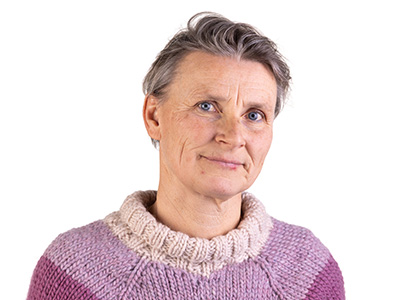Katarina Ejeskär

Have a MSci in molecular biology from University of Gothenburg, and since 2000 a PhD in clinical genetics from the Sahlgrenska Academy, Gothenburg. The thesis focused on the genetics of neuroblastoma. Had a research group at Sahlgrenska Academy until 2015, and am an Associate Professor (Docent) in experimental clinical genetics at this academy.
Since 2015 Professor in Biomedicin at University of Skövde, and research group leader for the research group Translational Medicine TRIM. I am responsible for the fruit fly facility at the university, that is used both in research and in the education. Teaches mainly in the Biomedicine program in genetics, tumor biology and thesis work courses. Am main supervisor for two PhD-students.
Research
My main research focus is childhood cancer research; neural tumors, mainly 11q-deleted neuroblastoma. The project focus on the genetic changes in the tumor, and how they affect the tumor growth and survival. We use cell culture, the fruit fly and some primary tumor material to test hypotheses, that we get from analysis of genetic data from publically available databases.
I am also engaged in a number of collaboration projects:
- One with PhD Ferenc Szekeres that focus on digitoxin treatment of pancreatic cancer.
- One with Professor Homa Tajsharghi that focus on rare genetic disorders.
- One with Doc. Åsa Torinsson Naluai that focus on gluten intolerance, diabetes and probiotics.
- One with Doc. Victoria Rotter Sopasakis that focus on alternative splicing and PI3K-signaling.
- One with Doc. Frida Abel that focus on fusion genes in braintumors.
2025
BMC Gastroenterology
2025. Article.
https://doi.org/10.1186/s12876-025-03705-5
Molecular & Cellular Oncology
2025. Article.
https://doi.org/10.1080/23723556.2025.2503069
2024
International Journal of Translational Medicine
2024. Article.
https://doi.org/10.3390/ijtm4020013
2023
Brain
2023. Article.
https://doi.org/10.1093/brain/awad257
2022
Cancer Genomics & Proteomics
2022. Article.
https://doi.org/10.21873/cgp.20354
Scientific Reports
2022. Article.
https://doi.org/10.1038/s41598-022-24140-6
DNA Repair
2022. Article.
https://doi.org/10.1016/j.dnarep.2022.103302
Journal of Cancer Research and Clinical Oncology
2022. Article.
https://doi.org/10.1007/s00432-022-04029-7
International Journal of Molecular Sciences
2022. Article.
https://doi.org/10.3390/ijms23158237
Medicine International
2022. Article.
https://doi.org/10.3892/mi.2022.52
2021
2020
2018
2017
2016
2015
2013
2012
Ongoing projects
Protein interactions and their impact on the immune system in type 1 diabetes
We research why children develop type 1 diabetes. We know that the body’s immune system mistakenly starts attacking the cells that produce insulin, but it is still unclear what triggers this process.
June 2025 - June 2029 67927Can mobile phone-based follow-up and treatment reduce alcohol consumption?
The aim of the research project is to investigate whether digital tools offering cognitive behavioral therapy (CBT) can be used to enhance interventions targeting individuals with risky alcohol use.
December 2025 - December 2026 67927How are eye movements and biomarkers during moderate alcohol consumption?
The research project focuses on examining how eye movements and biomarkers are affected by moderate alcohol consumption. The study aims to conduct and evaluate digital measurements of eye movements and biomarkers.
January 2024 - December 2026 67927Finished projects
Can the development of type 2 diabetes be avoided through a diet low in gluten or probiotic supplements?
We are investigating whether the risk of developing diabetes can be reduced by avoiding gluten in the diet and whether probiotic supplements (Probion Active) can have a similar effect.
January 2023 - December 2023 67927Obesity and androgen excess in women – adiponectin as a new treatment option
We focus on the molecular link between androgen excess and the development of reproductive disorders, obesity, and type-2 diabetes in females. Our overall aim is to investigate new treatments and identify the underlying mechanisms that improves or protect against the development of diabetes and decreased fertility. My line of research has evolved from more than 10 years of experience in whole-animal physiology studies involving endocrinology, metabolism and re-production.
January 2019 - December 2021 67927NOX, ROS and metabolism in Pancreatic Ductal Adenocarcinoma
The scientific work that will be performed in this project is to explore new pathways of cancer treatment with particular focus on pancreatic cancer. These new ways of treatment are based on changing the functions of different signaling and metabolic pathways such as NADPH oxidase (NOX), reactive oxygen species (ROS) and metabolism which are known to be up-regulated or malfunctioning in cancer cells. By using different chemicals such as NOX inhibitors, digitoxin and ketone bodies inhibit their activity and thereby decrease the cell viability of the cancer cells. Focusing treatment on the differences between normal / cancer cells would help develop methods that inhibit cancer cells with less negative effects on normal cells.
September 2016 - September 2021 67927Genes as targets for cancer treatment
We investigate genes that cause cancer aggressiveness. We specifically focus on the childhood cancer tumor neuroblastoma, which occurs in the nervous system of young children. Some tumors are more aggressive than others, and the difference is what has happened to the genes in the tumor. If the tumor has lost some of the genes on chromosome 11, the child has a poor prognosis. We test the properties of genes that have been lost, to see if those specific lost properties are something that will benefit the tumor cell. We want to replace those properties through different types of treatments, and in this way kill the tumor cell. We analyze clinical/genetic data and make experiments in cultured cells and in fruit flies.
January 2015 - July 2021 DHEAR – for a healthier and more sustainable soci